
Back and forth with The Fall And Rise Of Reginald Perrin
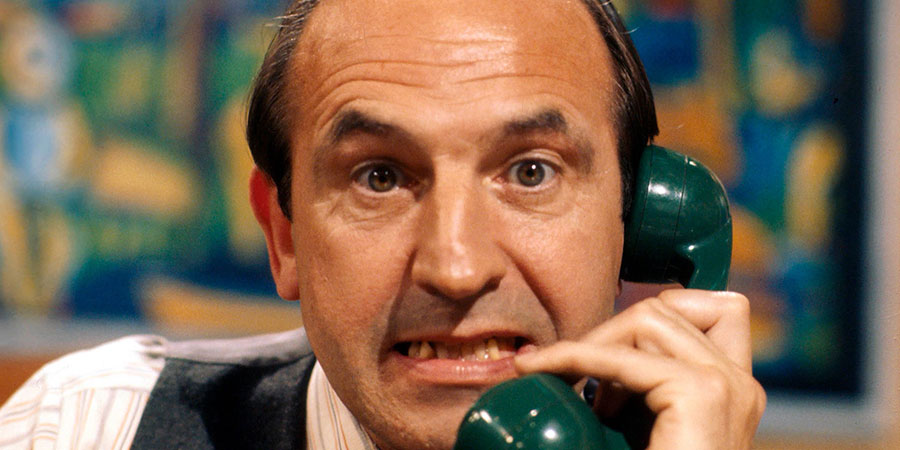
"Do you find you can't finish the crossword like you used to?" the doctor began. "Nasty taste in the mouth in the mornings, can't stop thinking about sex, can't start doing anything about sex, wake up with a sweat in the mornings, keep falling asleep during Play For Today...?"
His patient was impressed. "Extraordinary, Doc, that's exactly how I've been feeling."
The doctor sighed. "So do I - I wonder what it is?"
Back in 1953, creator David Nobbs had been struck by lightning during a school cricket match. "It wasn't a direct hit or I wouldn't be where I am today," he recalled later. "There was a peal of thunder and, simultaneously, a great flash of lightning. An electric current surged through my body. My feet were rooted to the ground. I looked at the two other boys who were fielding close to the wicket. Their faces had gone white, utterly white, ghostly white. Their hair was standing on end. Then their hair returned to normal, and I could move my feet again." Nobbs survived and twenty years later, was in a sense struck by lightning again. He was about to create The Fall And Rise Of Reginald Perrin and it was to be by far the biggest success of his entire career.
It had all began one day on a deserted beach: in fact, West Bay located near Bridport in Dorset. A lone figure, a middle-aged man can be seen running towards the sea, tearing off his suit as he does so, before finally leaving his clothes in a little pile on the sand, before running stark naked into the water.
This was the title sequence for The Fall And Rise Of Reginald Perrin by David Nobbs. The first ever episode aired on BBC One on Wednesday 8th September 1976. But was this the beginning or the end? And was everything really as it appeared to be?
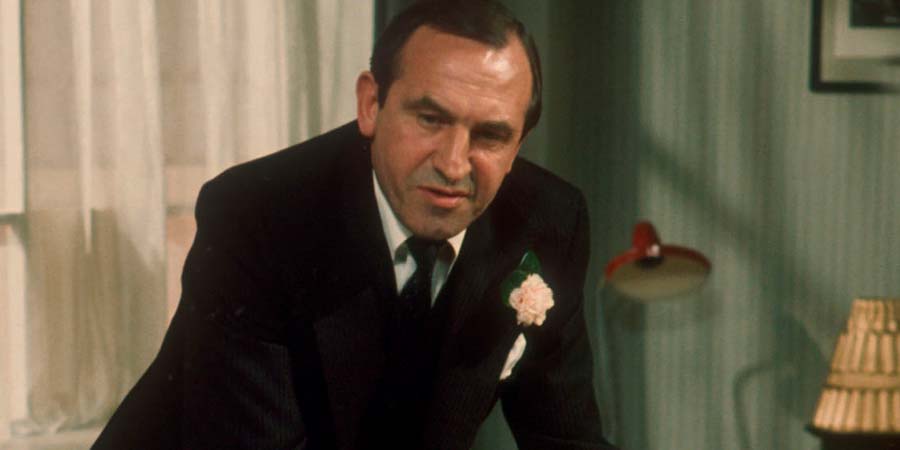
For, on the one hand, the new series had all the trappings of a conventional British sitcom. The man on the beach was easily recognisable as Leonard Rossiter, who, thanks to his portrayal of the miserly landlord Rupert Rigsby in Eric Chappell's hugely successful ITV comedy Rising Damp since 1974, was already one of the most famous sitcom stars in the land. The theme of the opening episode (happily married but restless office employee has a mid-life crisis) had some similarities to that of the first ever edition of The Good Life, which had premiered the year before. Unlike The Good Life, however, the new show would feature a high number of catchphrases. Furthermore, the theme tune was composed by sitcom veteran, Ronnie Hazlehurst. There was also a studio audience present, who could sometimes be heard shrieking as Rossiter's arse disappeared into the water at high speed. Surely then, this was just another situation comedy?
And yes, The Fall And Rise Of Reginald Perrin was undeniably a sitcom more than any other genre. But there was nevertheless something different about it. Appearances could be deceptive; for one thing, such was the magic of television, we never actually saw Rossiter's arse: he was, in fact, wearing flesh-coloured underpants. Rossiter also didn't actually go into the sea, being replaced at the last minute by stuntman Ken Barker.
More importantly, as Hazlehurst's unusually melancholy theme indicated, this had a darker undercurrent than other sitcoms: the first series is essentially the story of a middle-aged man having a nervous breakdown as a result of boredom and stress - certainly not the usual subject matter for a mainstream 1970s comedy series.
When we first meet Reginald Iolanthe Perrin (initials: R.I.P.) he comes across as a normal, but essentially unhappy 46-year-old man, and compared to Rigsby, Leonard Rossiter's other great sitcom character, very successful. Reggie himself feels he should be happy but isn't. He has a loving and understanding wife, Elizabeth (Pauline Yates) and a pleasant grown-up daughter, Linda (Sally-Jane Spencer). He has a house and no obvious money worries. But he hates his job ("Have a nice day!" "I won't!") and lives a life characterised by repetition, his daily commute always delayed for a bizarre variety of reasons ("defective bogey at Earlsfield" or "badger in a junction box at New Malden"). And with the exception of his immediate family and his secretary (Sue Nicholls, now better known for playing Audrey Roberts in Coronation Street), who he secretly lusts after, almost everyone he knows - from his doctor (John Horsley) to his "bearded prig" son-in-law, Tom (initially played by Tim Preece, later by Leslie Schofield) - is slightly odd.
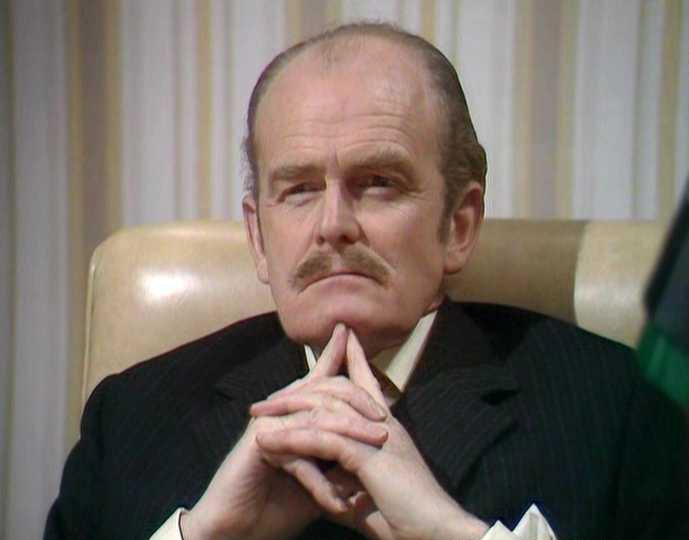
Perhaps most memorable is Reggie's boss, C.J. (John Barron), a megalomaniac with pictures of himself all over his office and a chair that makes a farting noise to embarrass and undermine any visitors (such as Reggie) when they sit in it. C.J. is prone to mangling proverbs, such as "It's the early bird who catches the quick brown fox".
He is also keen on a particular phrase, adapting it to suit whatever conversation he's having. Sometimes this is normal. More often it becomes an increasing bizarre consequence of whatever situation he finds himself in such as: "I didn't get where I am today by being disguised as half a compost heap" or "I didn't get where I am today by selling ice cream tasting of bookends, pumice stone and West Germany."
"Great!", "Super!" as Reggie's sycophantic colleagues would say.
Then there is Jimmy (Geoffrey Palmer), Perrin's brother-in-law, an amiable chap with a military background and a tendency to speak in short bursts such as: "bit of a cock-up on the catering front".
Palmer, interviewed for Guy Adams' superb biography Character Driven: The Life Of Leonard Rossiter, said he "enjoyed playing Jimmy, who, along with everyone else, was larger than life, with a brain that was ready to explode. But there was always a germ of truth and reality in Reggie and the rest of them. Take Jimmy: he's a sad failure in every way but is full of good intentions. He tries to be a public schoolboy and an officer but fails in both."
Gradually, we see how Reggie's small but quiet attempts at rebellion - picturing his unseen mother-in-law as a hippopotamus, indulging in lurid sexual fantasies about his secretary, being brutally honest ("really? Now that is uninteresting!") inserting random words such as "earwig" into the odd sentence lead him to unravel completely, culminating in a single dramatic crisis at the end of the first series.
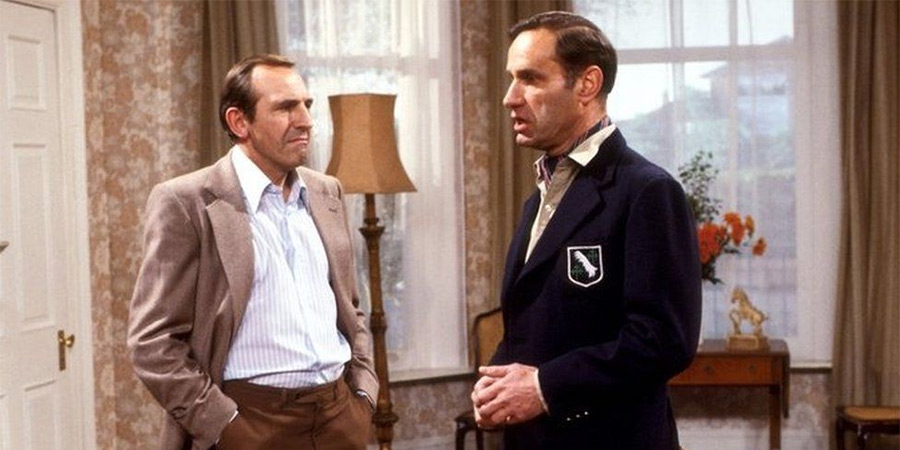
Like Richard Gordon's Doctor In The House or Simon Nye's Men Behaving Badly, The Fall And Rise Of Reginald Perrin was a sitcom that had started out as a novel, originally entitled The Death Of Reginald Perrin (1975). Already a novelist as well as a prolific writer of jokes for TV comedians including Les Dawson, Kenneth Williams, Dick Emery, Frankie Howerd and The Two Ronnies, Nobbs had adapted Perrin from a TV play of his own that had been rejected. "I wrote it as a novel with considerable difficulty," he explains, "the second half didn't work for ages, but I got it right eventually." He originally envisaged Perrin ending up in a lunatic asylum, but soon arrived at a much more satisfactory solution (which we won't reveal here).
Some thought Perrin's fictional experience bore some resemblance to that of the real-life case of Labour MP John Stonehouse, which generated headlines throughout 1974. Did Stonehouse inspire Perrin or vice versa? In fact, in his autobiography, I Didn't Get Where I Am Today, Nobbs was very clear: "No, the book was written and delivered before he did it. So, did he get the idea from me? Highly unlikely, since he did it before the book was published." Nobbs did admit to naming his character after his own MP, however: the former Conservative Home Secretary, Reginald "Reggie" Maudling. Fifty years on, the rise and fall of John Stonehouse became the subject of an ITV drama starring Matthew Macfadyen earlier this year.
The book was darker than the television series would be and includes an affair between Jimmy and Reggie's daughter. And like its adaptation became, it was a significant success. One man was particularly fulsome in his praise, "Reggie Perrin ... inhabits an intriguing, mundane world. A world in which everyone jogs along quite nicely, and then, suddenly out of the blue, nothing happens...I laughed two hundred and eighty-seven times and cried twice. What a beautiful book." The praise came from Ronnie Barker. In fact Barker was initially seen as the favourite to play Perrin on screen, before Rossiter was cast in the role.
Nobbs was unsure about Rossiter to begin with. "My original thoughts were that he was a very fine actor that didn't at all look like the picture [of Reggie] in my head. Though I was in my forties, I was still inexperienced enough to think that mattered so I had slight doubts - which didn't last very long as then I saw Rising Damp and decided that, yes, he would be the man."
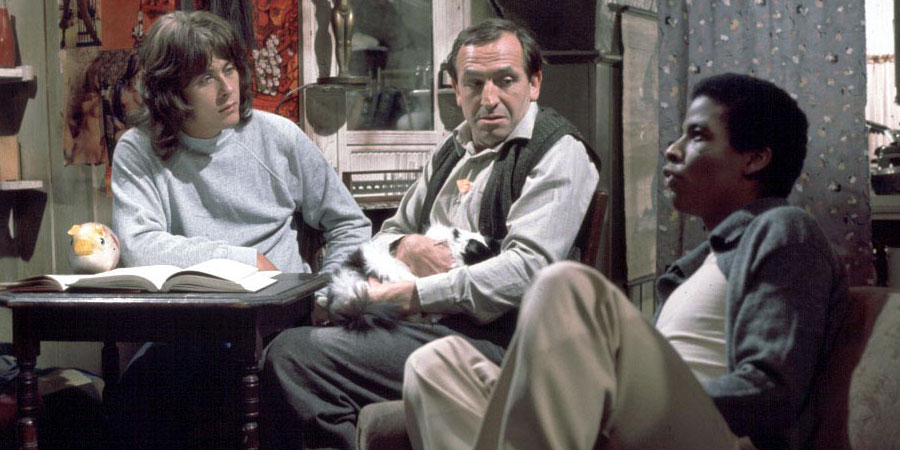
David Nobbs was also wary after hearing rumours that Rossiter (who had worked with Stanley Kubrick) could be a difficult perfectionist. These rumours were true, although ultimately Nobbs himself had a very happy time working with him. Some of the cast (such as John Horsley, who played Doc Morrissey) found him intimidating, but all agreed his exacting methods and vigorous dedication were of huge benefit to the show. Others, such as John Barron, who played C.J and had known Rossiter since the Fifties, knew what to expect.
Nobbs knew for sure he had a hit on his hands when he started encountering people quoting the show's catchphrases ("I didn't get where I am today...Great! Super!") in everyday life. "Originally it was only ever seen as one series," producer Gareth Gwenlan explained later, "because David's novel reached a natural conclusion. But halfway through filming, things were going so well that I asked David if there was any chance of another."
In fact, there would be three series in total, with Rossiter insisting Nobbs wrote each as a novel first to ensure they had sufficient depth. The first book, now renamed The Fall And Rise Of Reginald Perrin (the name of all three of the 1976-78 TV series) was thus followed by the books The Return Of Reginald Perrin (1977) and The Better World Of Reginald Perrin (1978). "The fact of it starting with the book was very important," Nobbs argued. "I am not really a sitcom writer - it's not really my métier - and it worked because it wasn't really conceived as a sitcom."
None of the series are bad, but by the end of the third it was becoming clear the concept was running out of steam. "Reggie Perrin couldn't have gone on forever," said Geoffrey Palmer. "It had to be finite, really."
Alongside Rising Damp, Leonard Rossiter had pulled off the difficult trick (achieved by Peter Bowles, Chris Barrie and a few others) of starring in two smash hit sitcoms at the same time, before the series proper ended in January 1979. He would play Reggie only once more - in a David Nobbs-scripted segment of the 1982 comedy special, The Funny Side Of Christmas, appearing alongside short festive outings of other comedies including Butterflies, Yes Minister and Only Fools And Horses.
And that was it. The Fall And Rise Of Reginald Perrin was over. But this was not quite the end of the story.
Less than two weeks after actor Leonard Rossiter's untimely death in October 1984, Geoffrey Palmer's character, Jimmy returned in David Nobbs' Channel 4 series Fairly Secret Army. Or did he?
The series developed from a conversation in the second series of Perrin, in which the right-wing Jimmy had attempted to recruit Reggie to join a private army to combat the perceived threat of trade unions and the Left. Reggie rejects Jimmy's suggestion, but Nobbs picked up the idea for this later sitcom, creating a potential spin-off in which Reggie's hapless brother-in-law attempted to put his hare-brained scheme into practice. (Despite the title, the new series had little in common with the Seventies BBC French resistance drama Secret Army, which was already being sent up by David Croft and Jeremy Lloyd in 'Allo 'Allo!.)
Nobbs soon encountered a problem, however. Fairly Secret Army was to air on the still-new Channel 4, but TV rights for Jimmy - and indeed all the other characters - was still owned by the BBC. Jimmy was thus renamed Harry Kitchener Wellington Truscott to get round the issue: resultingly, despite being clearly intended as a Perrin spin-off, Fairly Secret Army cannot truly be counted as one. The notion of armed militias being needed to save the country from socialism was less fashionable in the Thatcherite Eighties than the Seventies, but the show worked well and ran for two series until 1986.
America attempted their own version of Perrin in the Eighties. Reggie starred Richard Mulligan, best known for the sitcoms Soap and, later, Empty Nest, as the increasingly desperate employee of Funtime Ice Cream. But with no real context offered for Reggie's frustrations (as with Jack Nicholson in The Shining, he just seems crazy from the outset), this remake was doomed to failure.
In 1996, with almost the entire cast - except crucially Rossiter - still alive, Nobbs produced a new novel and series, The Legacy Of Reginald Perrin. The idea was that Reggie had been killed by a falling advertising billboard and had bequeathed a million pounds to each of the characters on condition they do something genuinely absurd.
"I thought it would be rather bold and exciting to do a thing about Reggie without Reggie," Nobbs explained. "I thought the other characters were strong enough and I had a plot idea of a rebellion of old people against the youth culture of the time. I think, in retrospect, it was not such a clever idea - it wasn't perhaps as bold as I had thought."
In truth, the new series was not bad. But even with Jimmy taking a much more central role (Geoffrey Palmer being a much bigger name in the 1990s than he had been in the 1970s) the glaring absence of Leonard Rossiter blighted the whole enterprise. Audiences didn't warm to it.
"There was some wonderful stuff in it because David cannot write badly," reflected Palmer, "but to do Reggie Perrin without Len Rossiter - what are the other characters without him?"
The same problem probably essentially doomed the 2009-2010 series, Reggie Perrin which attempted to update the whole idea to a 21st Century setting. A collaboration between Simon Nye and the now elderly David Nobbs, the new series starred Martin Clunes and Fay Ripley and ran for two series.

In 2015, David Nobbs died at the age of eighty. In a long and successful career that saw him write twenty novels - including books and TV versions of the Henry Pratt stories and A Bit Of A Do - The Fall And Rise Of Reginald Perrin was undoubtedly his biggest success.
Quoted again in Guy Adams' excellent biography of Rossiter, Geoffrey Palmer, who died in 2020, reflected on the timeless appeal of the series. "It's an eternal theme, it will appeal to anyone who's doing a job they can't stand. And it goes beyond that into this crazy [sticks his two fingers up] to the world, to the bosses, to the government, to everybody, to all institutions. It's wonderfully anarchic in that way."
The characters live on. As recently as 2022, David Haig starred in a two-part adaptation of The Fall And Rise Of Reginald Perrin on BBC Radio 4.
Could Reginald Perrin, even today, nearly fifty years after he was first created, still make yet another return form beyond the grave? Don't ask us. We didn't get where we are today by speculating about things like that.
Where to start?

Series 1, Episode 1
Creator David Nobbs once said: "I didn't really see it as a sitcom, I saw it as the adaptation of the book. It was the story that mattered, and it did sort of move the sitcom on a bit, I think, because of that."
With this in mind, The Fall And Rise Of Reginald Perrin is undoubtedly best viewed from the very beginning: that is Series 1, Episode 1. This is the only way to fully appreciate the intricacies of Reggie's downfall exactly as they were always intended to be viewed.
The Fall And Rise Of Reginald Perrin books
Help us publish more great content by becoming a BCG Supporter. You'll be backing our mission to champion, celebrate and promote British comedy in all its forms: past, present and future.
We understand times are tough, but if you believe in the power of laughter we'd be honoured to have you join us. Advertising doesn't cover our costs, so every single donation matters and is put to good use. Thank you.
Love comedy? Find out moreThe Fall And Rise Of Reginald Perrin - The Complete Collection

This definitive collection includes all 21 episodes from the three series of The Fall And Rise Of Reginald Perrin, as well as an array of additional features which are new to DVD, including the post-Reggie series The Legacy Of Reginald Perrin and a special 1982 Christmas sketch.
The Fall And Rise Of Reginald Perrin remains one of the greatest comedies ever broadcast. From a terminally frustrated commuter who fakes his own suicide, to the boss of Grot, a shop selling useless junk, to running a commune for the middle-aged and the middle-class, Reginald Perrin - and his family and colleagues - provided a hilarious satire on modern life.
The magnificent performance of Leonard Rossiter held the series together, but the show also boasted David Nobbs' consistently witty scripts and a supporting cast of fantastic characters and a host of enduring catchphrases.
The series The Legacy Of Reginald Perrin (made after the sad death of Rossiter) saw the return of Jimmy, CJ, Tom, Doc and the others, as a deceased Reggie's will inspires them to do something totally and utterly absurd. And, from the BBC's The Funny Side Of Christmas (which featured festive versions of top comedy shows) comes a five-minute sketch of Reggie's Christmas Day.
The Comedy Connections documentary on the making of the series completes this comprehensive collection.
First released: Monday 27th April 2009
- Distributor: 2 Entertain
- Region: 2
- Discs: 5
- Catalogue: BBCDVD2365
![]() Buy and sell old and new items
Buy and sell old and new items
Search for this product on eBay
BCG may earn commission on sales generated through the links above.
- Released: Tuesday 5th May 2009
- Distributor: E1 Entertainment
- Region: 1
- Discs: 4
- Minutes: 630
- Subtitles: English
![]() Buy and sell old and new items
Buy and sell old and new items
Search for this product on eBay
BCG may earn commission on sales generated through the links above.

